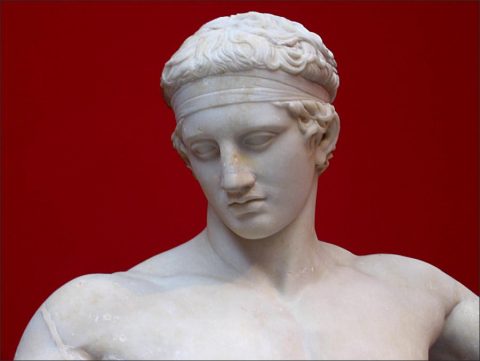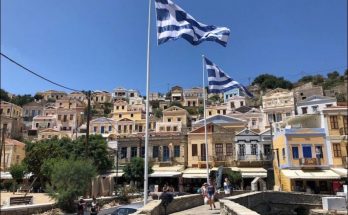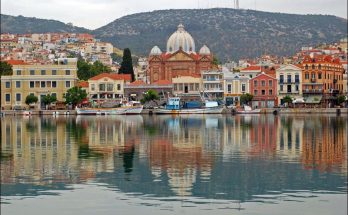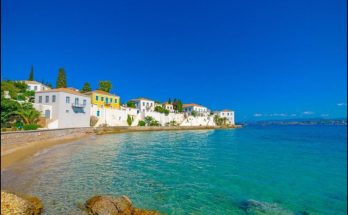Pindar was born at Cynoscephalae, a village near Thebes in Boeotia, about 520 B. C. He began early the practice of lyrical composition: a pretty story relates that in his childhood bees laid honey upon his lips as he slept. Among his instructors were the local poetesses Corinna and Myrto, and later the illustrious Lasos of Hermione. At the age of twenty he produced his first extant poem, the Tenth Pythian ode. He probably visited Sicily, and perhaps Cyrene. His praise of Athens, we read, so annoyed the Thebans that they fined him; the sum was paid by the Athenians. He died about 440 B. C. Arrian relates that when Alexander the Great destroyed Thebes, he spared the house of Pindar alone.
Ancient scholars arranged his works in seventeen books, four of which–the Epinician Odes–are alone extant, though we possess many fragments of others. These odes are poems in honour of victors in the great athletic contests: fourteen Olympian odes, twelve Pythian, eleven Nemean, seven Isthmian. They were composed for performance by a ‘chorus’–a company who danced and sang. Pindar’s fame was widespread. Nobles of Aegina and Sicilian princes are conspicuous among his clients. The Seventh Olympian (perhaps his greatest work), written to celebrate Diagoras of Rhodes, was engraved in gold letters upon a temple-wall at Lindos in that island.
Pindar marks the close and culmination of the great lyric age. A new type of literature, the dramatic, was rising. With this artistic change a political development kept pace: Athens was coming rapidly to the fore–a great democracy, depending upon maritime commerce. Pindar loved, and wrote for, an order which was losing ground, the Dorian nobles of the old agricultural states. His ideas are in the main their ideas. He never wearies of praising Heracles, the Aeginetan line of Aeacus, the stern discipline of the Dorian code.
In life, athletics, and his own art, he extols ‘nature’ (phua) or inherited ability, as compared with uninspired ‘training’ (mathesis). Whenever he mentions the ‘citizens’ it is with aloofness, a tinge of fear, a tinge of contempt: the glorious victor must expect their envy; the brilliant prince should be wise, kind, and firm in governing them. For the mightiest democracy of all, Athens, he reveals high admiration–‘City of splendour, violetdiademed, the theme of song, bulwark of Hellas, famous Athens, filled with Presences divine’. But he is most at home in the older types of society, his own Thebes, or prehistoric Orchomenus which he hymns so tenderly in the Fourteenth Olympian, a poem full of the Graces who rule the ancient town and quietly resonant with its gentle waters. It is, indeed, the Graces, even more than the Muses, to whom he ascribes his inspiration.
They, and all the gods, appear incessantly in his work, themes of invocation or story uttered with wondering reverence and trust. He was deeply concerned with the religions of ‘mystery’, those doctrines of life beyond the grave which permeate the Second Olympian and the beautiful Dirges whereof some few fragments remain. ‘For them shines the power of the sun below while it is night with us; set among meadows of scarlet roses, the fringe of their city lies embowered in fragrant trees that bend beneath golden fruit…’ Why are these topics, gentle breeding, politics, religion, found in poems which celebrate boxing-matches or chariot-races? First, the fact itself which he commemorates is (for such powers) narrow in scope and varies only in detail from contest to contest. He must join other themes with it; otherwise his work would have been as monotonous as the efforts put forth by our own chroniclers of cricket and football.
Secondly, the subject is not after all so narrow as we are prone to think. The games were part of religion; all contests were in honour of some god: Zeus at Olympia and Nemea, Apollo at Pytho, Poseidon at the Isthmus. These odes normally include, with praise of the victor and some details of the contest, a ‘myth’–some brilliantly told story of god of hero-eulogy of the victor’s city, recital of successes gained by his ancestors, and advice, social or moral, which often includes wider commentary upon life. ‘First of prizes is good fortune; the second luck is good repute; if a man meets and seizes both, he has received the supreme garland’.
But the chief fact about Pindar is that, alone among great poets, he is mainly aesthetic. Beauty, not righteousness, is instinctively. his ideal. This, even more than the difficulty of his Greek, has tended to put him in the category of authors who are talked of, but not read. We shall not discuss here whether aesthetic fact is as authentic as moral fact. But almost every one thinks of the former as inferior to the latter: it is far more common to say ‘I value beauty because it makes me a better man’ than to say ‘I value righteousness because it sharpens my appreciation of beauty’.
Pindar stands apart from the great European tradition in which his contemporary Aeschylus is so commanding a figure. The result is that we find in his work not great characters, not great action, but great pictures. He is a magnificent colourist: fitly does he bid his Muse weld together gold, ivory, and coral. In the Sixth Olympian, the birth of Iamos is described in language that recalls Botticelli: ‘And she, laying aside her purple-broidered girdle and cruse of silver beneath a dark thicket, gave birth to a man-child on whom was the spirit of God. To her aid the golden-haired Apollo sent compassionate Ilithyia and the Fates.’ The pictures, we see, are in motion, but each presents one incident. So in the superbly luxuriant opening of the Fifth Nemean he cries:
‘No maker of statues am I, to create slumberous images standing inert upon their pedestal. No! upon every merchant-vessel, every skiff, sweet Minstrelsy, speed for Aegina, spreading the news that Lampon’s son, Pytheas of mighty thews, has won the garland in the pancration at Nemea, though not yet upon his cheek appears the tender bloom like that of budding grapes.’
All his work blazes with verbal beauty, not riotous but governed by that sense of measure, of form, which all Greek writers of the classical period instinctively follow. Gold, flowers, beauty of body and physical action, radiance and sparkle of sun and wine–these fill his odes with a splendour which at times would intoxicate the mind were it not for the steady surge of his rhythm, the studied balance of his structure.
For Pindar has far more than magnificent words; he moulds them into superb sentences: ‘Hail, god-built Island, blossom most beloved by shining-tressèd Leto’s children, daughter of the sea, broad earth’s marvel unremoved, which mortals name Delos, but gods in Heaven the far-shining star in the sombre expanse of Earth’. To this majesty of phrase he joins mastery of exquisite rhythm–to hear and feel the great Dorian measure thundering through the vast spaces of the Fourth Pythian is a joy and amazement even after the marvels of Homeric verse.
It is this glory of language wedded to magnificent rhythm that makes Pindar of all poets the most difficult to translate; it is indeed quite impossible to do so with any approach to adequacy. If one combined the powers of Milton and Swinburne, one would still fail, because his effects depend upon the very texture of the Greek language far more closely than the effects of any other poet. Nevertheless, people attempt to translate him, as if one made a model of Niagara out of calico.
Such versions do assist us to find the external ‘meaning’ of the Greek, but a far better conception of Pindar’s work may be gained from Gray Progress of Poesy or Matthew Arnold Westminster Abbey. The latter poem shares at least one splendid quality with the Pindaric ode. Arnold conceives his friend Stanley as a source of light in his generation, and throughout the elegy this thought of light recurs in varied and beautiful forms.
So, for instance, in the First Pythian. The poet begins with that sublime address to Music as the power which instils harmony into the breasts of all gods and creatures, and before which all lawless discordant things tremble. So he passes to Hiero’s warfare against the Etruscans–Hiero the champion of order and civilization, his enemies the exemplars of lawless might, like the Titans who opposed Zeus. Throughout runs the conception of music, harmony, order, facing discord and barbarism.
That is why he speaks of the war-yell uttered by the Etruscans and prays Heaven for tranquillity in Hiero’s domain; why at the close, in mention of another Sicilian prince–the hateful Phalaris-he contrasts the bitter talk, which keeps his name in ill remembrance, with the minstrelsy of harps beneath Hiero’s roof and the gentle lilt of boyish voices. Again and again the study of a Pindaric ode will reveal some simple picture which gives deepened meaning and golden structure to the sequence of prayer, exhortation, myth, and metaphor which else might seem disjointed, however lovely.
Visits: 320



